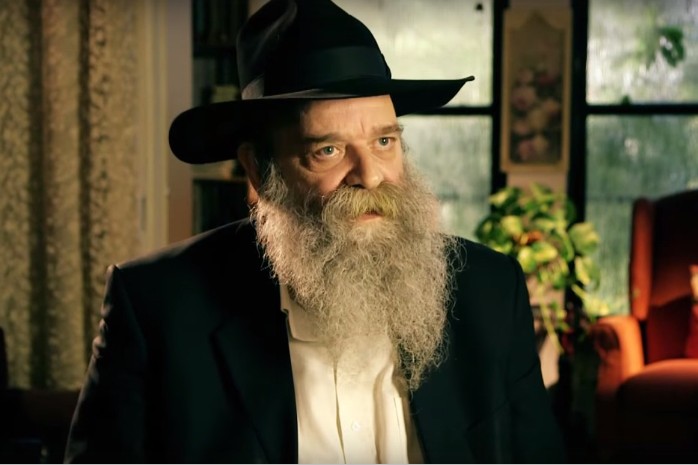Personal Stories
The Four Stages of the Soul: Rabbi Yair Kalev Explains the Path from Darkness to Inner Light
A deep look at ego, mission, emotional struggle, and the Chassidic roadmap to authentic self-growth and spiritual clarity
- Hidabroot
- |Updated

When Rabbi Yair Kalev was hospitalized in the intensive care unit at Tel HaShomer in critical condition, he underwent surgery with five bypasses. "They performed resuscitations on me. When I finally left the hospital, I was a broken vessel — weak and depressed. I’m used to being energetic, and it was very hard for me to face my new reality. I experienced waves of depression. And what is depression? It’s when you tell yourself, ‘Your story is over….’”
But Rabbi Kalev did not surrender to depression. As someone who has taught Chassidut and Tanya for decades, he began repeating to himself the very teachings he had always given others.
“I said to myself: Let’s see you actually do what you always tell your students — It’s okay to fall, but don’t forget to get up! I felt like a person in a new incarnation. Life after seeing death up close is not the same life.”
Today, when Rabbi Kalev lectures across Israel and around the world — his talks interwoven with ancient Chassidic melodies, he insists he has no interest in creating a following, branding himself as a “spiritual advisor,” or positioning himself as a marriage counselor.
What he does, he says, is simply help people learn how to help themselves. “I’m only sharing my journey. I do everything I can to open a window for as many Jews as possible. I grew up in an environment of aggressive anti-religious coercion from infancy, and I know the alienation it creates. My life’s mission is to show the light and the mental health that exist in Judaism.
I don’t do ‘baal teshuvah outreach’ in the sense of ‘become like religious people.’ When I returned to Torah, I didn’t want to become like anyone — I didn’t want to lose my individuality. I returned in order to restore the inside, the heart. I returned so I could learn how to fulfill my own unique mission in this world. Every person has a task that only they can do. If someone doesn’t do their best and develop their abilities, they are betraying their mission.”
“People today suffer deeply — so it’s easy for someone with influence to fall into ego.”
“The temptation is huge,” Rabbi Kalev says. “The ego whispers: I am deep. I am sensitive. I am amazing. And then you can’t speak eye-to-eye with anyone anymore.
Truly great people speak at eye level. I don’t come to fix others — I come to fix myself. When you really mean that, the truth becomes recognizable and enters the heart.
There is no place for arrogance toward anyone. Every person is a small cosmos, a whole world, and deserves full respect, care, and sensitivity — just as I give myself.”
 Rabbi Yair Kalev
Rabbi Yair Kalev“We’re all wounded — self-education is our life’s work.”
Rabbi Kalev views life as a process of ongoing self-education. “This is the decline of the generations — we’re all damaged today. A man is not a man, a woman is not a woman, and even a plumber isn’t a plumber. The wisdom is not to give up on ourselves but to focus on inner work and self-development.
Even the melodies I sing — these are tunes composed by tzaddikim who worked endlessly on themselves. The easiest thing is to focus on other people’s flaws — it makes us feel better, because, ‘There are idiots worse than me.’ But that doesn’t lead anywhere.”
How do you influence people while speaking at eye level?
“When a person allows himself to become refined, his environment becomes refined too. I came to heal, not to imitate anyone. All of Judaism is about teshuvah — returning to my true self. Everyone in his own way.
I’m a believer in individualism: unity does not mean uniformity. When each person brings out their best, they are no longer threatened by the other and can give them space.”
Why do some people refuse to help themselves?
“There are many reasons, and at the root is self-love that bribes us. A person can have incredible intelligence — but whom does he identify with inside himself? With the ‘Yaakov’ within him or the ‘Eisav’ within him?
If I identify with the idea of mission, I grow wings. But if I identify with ‘I’m doomed,’ then I sink.
We are our best friends and our worst enemies. Every person has an inner seismograph that knows the difference between truth and falsehood. But in this world it’s hard to hear it — especially under the crushing social pressure we face from childhood.”
The four spiritual stages of human development
Rabbi Kalev describes four stages in a person’s spiritual evolution:
“In Chassidut they say that a fetus in the womb is in the World of Atzilut — there is no threat at all. When he’s born, he enters the Higher Garden of Eden: only the radiance of the Shechinah is present, not God Himself. But the infant knows Someone is hiding — so he cries. Older people don’t cry, because they’re in inner conflict. A baby has no internal conflict.
Early adolescence is the Lower Garden of Eden. God no longer only hides — He disappears. We suddenly discover that our parents aren’t perfect and the world isn’t a cartoon but full of suffering. This is the World of Yetzirah. There is still clarity about right and wrong, and a sense of capability: I can act, I can achieve, I can become.
The final stage is the World of Asiyah. In Chassidut this world is called ‘double and redoubled darkness.’ Darkness doesn’t just hide the light — it denies that the light exists. One begins to justify wrongdoing, even attack people who fight for truth. That’s how a person becomes a negative messenger in the world.
There is no escaping mission: either we fulfill a positive mission or a negative one. I either bring holiness into the world or drive it out. There is no third option.
In this stage God not only hides but also disguises Himself. Good is mixed with bad and bad with good. Our task is self-education: awakening the point of truth inside, identifying with the Yaakov within, educating the ego so even it will speak, think, and act truth. Yes, even the ego can be educated. That’s a great innovation of Judaism — even a donkey can shine light. Even materiality can be transformed into good.
The thief will help people repent. Every weakness becomes a gateway to greatness. The place where you struggle most, is where your highest abilities lie. Judaism is built entirely on the principle that from the bitter comes sweetness.”
“If you educate yourself — you won’t need advice.”
Someone who works on themselves, Rabbi Kalev says, will know how to manage every area of life:
“You won’t have marriage problems, because you’ll stop trying to educate your spouse and instead educate yourself. You won’t cry over a lack of appreciation because you won’t depend on other people’s feedback. And when you change — your environment will change too.”
"The nation of Israel is called ‘a kingdom of priests and a holy nation,’” Rabbi Kalev concludes. “Rashi says ‘priests’ means servants. Our mission is not to build a platform for ourselves, but to serve truth. Only then can we return to being like the blissful infant in the womb — the state of Atzilut.”

